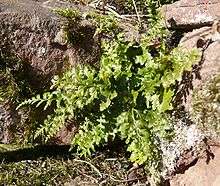Aspleniineae
Aspleniineae is a suborder of ferns in the order Polypodiales. It is equivalent to the clade eupolypods II in earlier systems;[1][2] it is also treated as a single very broadly defined family Aspleniaceae.[3] The suborder generally corresponds with the order Blechnales as described by J. L. Reveal in 1993.[4] Aspleniineae includes some important ferns, including Onoclea sensibilis, the sensitive fern, which grows as a virtual weed throughout much of its temperate North American range, and ferns of the genus Thelypteris, a genus that has shown remarkable speciation. It also includes one of the more common horticultural ferns, Matteuccia struthiopteris, the ostrich fern.
| Aspleniineae | |
|---|---|
 | |
| Asplenium adiantum-nigrum, the black spleenwort | |
| Scientific classification | |
| Kingdom: | Plantae |
| Clade: | Tracheophytes |
| Class: | Polypodiopsida |
| Order: | Polypodiales |
| Suborder: | Aspleniineae H.Schneid. & C.J.Rothf.[1] |
| Families[1] | |
| |
| Synonyms | |
|
Blechnales Pic.Serm. ex Reveal | |
Taxonomy
In the Pteridophyte Phylogeny Group classification of 2016 (PPG I), the group is treated as the suborder Aspleniinae, and divided into 11 families.[1] Alternatively, it may be treated as a single, very broadly circumscribed family Aspleniaceae sensu lato, which is then divided into subfamilies.[3] The relationship between the two approaches is shown in the table below.
| PPG I[1] | Christenhusz & Chase (2014)[3] |
|---|---|
| Suborder Aspleniineae H.Schneid. & C.J.Rothf | Family Aspleniaceae Newman |
| Family Cystopteridaceae Shmakov | Subfamily Cystopteridoideae Ching & Z.R.Wang |
| Family Rhachidosoraceae X.C.Zhang | Subfamily Rhachidosoroideae M.L.Wang & Y.T.Hsieh |
| Family Diplaziopsidaceae X.C.Zhang & Christenh. | Subfamily Diplaziopsidoideae Christenh. |
| Family Desmophlebiaceae Mynssen | (The only genus was described after 2014.) |
| Family Hemidictyaceae Christenh. & H.Schneid. | Subfamily Asplenioideae Link |
| Family Aspleniaceae Newman | |
| Family Woodsiaceae Herter | Subfamily Woodsioideae Schmakov |
| Family Onocleaceae Pic.Serm. | Subfamily Blechnoideae Hook. |
| Family Blechnaceae Newman | |
| Family Athyriaceae Alston | Subfamily Athyrioideae B.K.Nayar |
| Family Thelypteridaceae Ching ex Pic.Serm. | Subfamily Thelypteridoideae C.F.Reed |
Phylogenic relationships
The following diagram shows a likely phylogenic relationship between the families of Aspleniineae (as eupolypods II), based on Lehtonen (2011),[5] and Rothfels & al. (2012).[6]
| Aspleniineae (eupolypods II) |
| ||||||||||||||||||||||||||||||||||||||||||||||||||||||
References
- PPG I (2016). "A community-derived classification for extant lycophytes and ferns". Journal of Systematics and Evolution. 54 (6): 563–603. doi:10.1111/jse.12229.
- Alan R. Smith; Kathleen M. Pryer; Eric Schuettpelz; Petra Korall; Harald Schneider; Paul G. Wolf (2006). "A classification for extant ferns" (PDF). Taxon. 55 (3): 705–731. doi:10.2307/25065646. Archived from the original (PDF) on 2008-02-26.
- Christenhusz, Maarten J.M. & Chase, Mark W. (2014). "Trends and concepts in fern classification". Annals of Botany. 113 (9): 571–594. doi:10.1093/aob/mct299. PMC 3936591. PMID 24532607.
- Rodolfo Emilio Giuseppe Pichi-Sermolli ex J. L. Reveal in Phytologia 74:175. 1993.
- Samuli Lehtonen (2011). "Towards Resolving the Complete Fern Tree of Life" (PDF). PLoS ONE. 6 (10): e24851. doi:10.1371/journal.pone.0024851. PMC 3192703. PMID 22022365.
- Carl J. Rothfels; Anders Larsson; Li-Yaung Kuo; Petra Korall; Wen- Liang Chiou; Kathleen M. Pryer (2012). "Overcoming Deep Roots, Fast Rates, and Short Internodes to Resolve the Ancient Rapid Radiation of Eupolypod II Ferns". Systematic Biology. 61 (1): 490–509. doi:10.1093/sysbio/sys001. PMID 22223449.